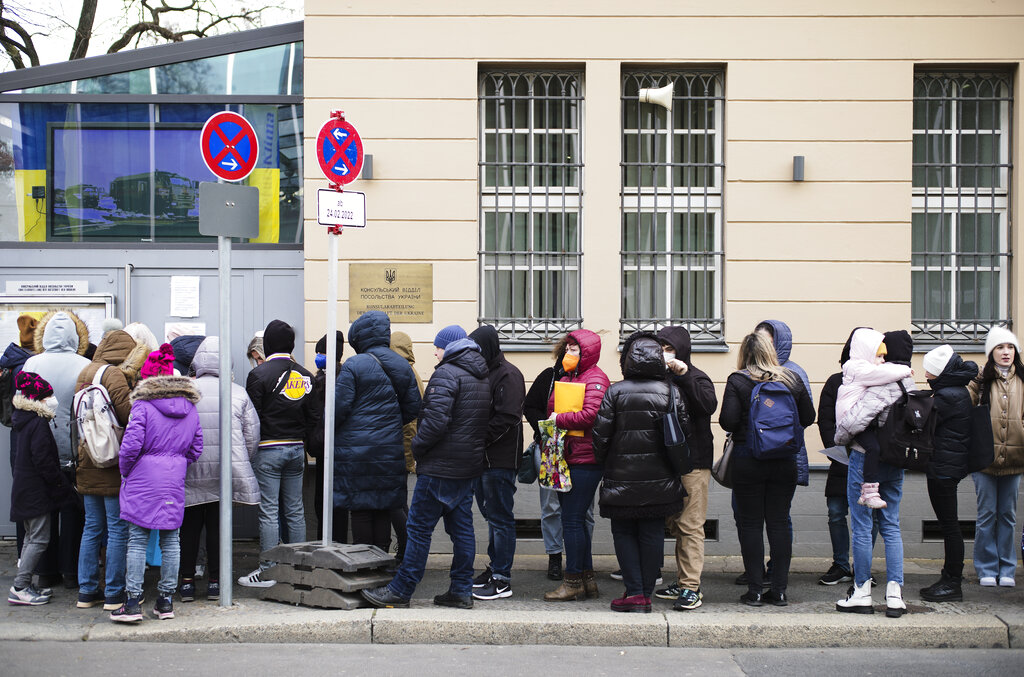Two-thirds of Ukrainian refugees living in Poland, Germany, and Czechia are satisfied with their new lives and intend to pursue citizenship in their respective host countries, new polling revealed.
According to a survey conducted by the Kyiv International Institute of Sociology (KIIS) last month, 28 percent of adult Ukrainian refugees living in the aforementioned European nations are completely satisfied in their new surroundings, while 38 percent are rather satisfied.
Just 6 percent are completely dissatisfied with their living situation in their new country.
As a result, 64 percent have already pursued or plan to pursue citizenship in their host country when they become eligible to do so.
A total of 12 percent of Ukrainian refugees have already submitted documents to apply for citizenship across the three nations, while 45 percent plan to do so. Meanwhile, 7 percent already have citizenship in another country and 34 percent do not plan on applying for it.
Ukrainians were split down the middle on whether they were now more or less likely to return home, with half leaning towards staying in their host country regardless of the political and economic situation back home.
Respondents were asked what conditions would be acceptable for them to move back to Ukraine with the most common answers relating to the existence of critical infrastructure and safety in their community.
One-third (34 percent) said they would consider returning home if critical infrastructure works normally in their settlement and they have confidence their settlement will be safe.
A quarter (26 percent) said they would not consider returning home until the full-scale Russian invasion was over, with the same number stating they wouldn’t return if their home had been destroyed and they were not offered a new one.
A total of 12 percent of all Ukrainian refugees said there were no conditions acceptable for them to move back home and expressed their intention to remain in their host country indefinitely.
This figure increases significantly when focused on Ukrainian refugees living in Germany, according to a previous survey by the Federal Office for Migration and Refugees (BAMF), which revealed just 34 percent of respondents would go home immediately after the war without qualification.
A total of 26 percent of respondents in that poll conducted in February last year said they had no plans to return to Ukraine and wanted to remain in Germany indefinitely.
Similarly, in a Poland-specific poll by Gremi Personal in March last year, 38 percent of Ukrainian adults seeking refuge in Poland planned to stay indefinitely.
These figures appear to be corroborated by the fact that the KIIS polling revealed that 34 percent of respondents do not follow the news on the latest developments in their country of origin and are not interested in information about Ukraine.
In a sidenote that lends itself to how Ukrainians are integrating into their host country, just 3 percent speak the language of their host country at home, with 97 percent either speaking Ukrainian or Russian.
Anton Hrushetskyi, the executive director of KIIS, said the poll’s findings showed how Ukrainians were “losing or have already lost their connection” with their home country.
“Unfortunately, this was completely expected, and in any case, we would have lost some citizens. However, the question of what percentage of citizens can be returned and what is the point of doing this remains open.
On the one hand, the state, Ukrainian civil society, and ordinary citizens should play their role in maintaining contact with citizens abroad, working with them, keeping in touch, and motivating them to return. On the other hand, communication cannot be one-way, that is, Ukrainians abroad also have their own ‘sphere of responsibility’ and must be motivated to return and make relevant efforts to maintain contact with Ukraine,” he added.
“On a personal level, many Ukrainians abroad face a difficult decision: to take root in a new place or wait for a certain moment to return. However, the decision must be honest with oneself and with Ukraine and Ukrainians. If there is a sincere desire to return, the government and Ukrainian society must show support.”





